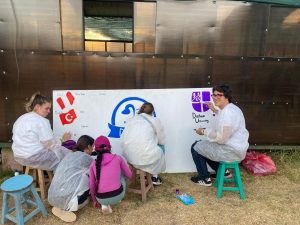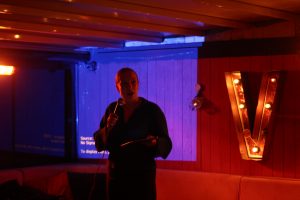Tara Oakley, the chair of the Durham University Charities Kommittee, sat down with Interview Editor Luke Alsford and discussed fund-raising challenges in a post-Covid world and the importance of charity for Durham’s local community.
Luke Alsford: Almost everyone at Durham University has heard of DUCK [Durham University Charities Kommittee], but maybe they do not always know what DUCK does. How would you describe DUCK?
Tara Oakley: Yeah, I think that’s a very fair question. We are basically the charity arm associated with the SU and we look after all of the fundraising that goes on within the Student Union. A lot of that is done by us personally. We put on our own events, we put on fundraisers: there are some pretty famous ones that Durham are known for, like our Jailbreak fundraiser. We also act as a bit of a spearhead when it comes to just fundraising in general within Durham. There are a lot of other charitable initiatives that are affiliated with the SU, that we kind of act as a reference point for the SU for. We try and coordinate all fundraising efforts in Durham. That is one of our agendas this year, is to make all fundraising efforts a little bit more consolidated.
LA: I feel that sometimes the Student Union takes a lot of criticism for being inactive, but if people knew that DUCK and all this charity work is so associated with the SU, that would really help its reputation. What do you think about that?
TA: Firstly, the SU is a really helpful point, because they deal with the governance things. DUCK itself is not a registered charity – the SU is a registered charity, so all of our paperwork and everything goes through them. They also have two employees, who are basically designated towards helping us, which is really good because there are a lot of technical aspects involved in running these events, that are associated with university and so need to be go through a proper process. For example, risk assessments we actually can’t process ourselves. As far as advertising goes, I think DUCK has a little bit of a struggle with exposure in general, and with the SU we are really trying to get a bit more marketing out there, so people actually know that they can promote our events and we’re part of the SU.
LA: Why do you think it is that DUCK struggles with exposure?
TO: Some students are exposed to more things than others are. Unless you follow our social media or you know someone involved in it, I think it’s quite hard to know about the events. And one thing we really struggled with is getting engagement up in a post-Covid world. People just don’t have the same appetite now as they did for in-person events. Considering that fundraising and charity in general is really associated around people being generous with their time, but also people being generous with their money. Obviously right now, with the current cost of living crisis, that’s a really hard point for us to sell because people are trying to manage themselves, let alone focus on giving to others. It’s just about getting that engagement up with people. We’ve been trying to make events really accessible: whether that’s having an option to join online, if we’re doing a talk. We’re also trying to be a little bit more informal in the nature that we run things. We ran our Charities Fair a few weeks ago, which is traditionally run in a very careers fair-style, where you get charities along and everybody and talks to them. But, this year, we made it more of a soiree evening, where the charities came along, there was some talks, there was a lot of socializing with students getting to hang out with like-minded people. Making events very fun and attractive to people has been really difficult and something we have to prioritize, because otherwise we just aren’t getting the same interest as we did before COVID.
LA: This sounds like a big job! Why was it important for you to get so involved in DUCK as Chair and how did that journey and take place?
TO: I’ve always been really interested in any kind of philanthropy and charity work. I have loved doing it for three years now. I was head of my charities committee at school, so when I came to university, I was immediately looking for a similar opportunity, because I find it really fulfilling and a really nice thing to be a part of. On the whole, the people that are part of these committees, are great, because they are be very similar-minded. They are passionate about similar causes, passionate about making an impact, and so for me it was very natural to go and search out a similar opportunity. So, in my first year, I started off in the events team. I’ve always loved events and organizing fun things. I then went on to be events officer, which is in charge of all the events. I then got elected Chairman this year. I just think it’s a really nice way to give back to the community, that we exist in as students. A lot of us aren’t from round Durham, and we take so much from Durham as a place and as universities, you can feel very disconnected from the area you are in. Whereas through DUCK and charity work, we can invest money and time into the local community and give back to that, and as a result, they really support the university and students in their endeavors as well. I just think that is something that should really be prioritized by students.
Tara speaking at DUCK’s Charities Fair
LA: One of your three goals for this year is “community”, shifting towards more locally based charities and outreach. Why is this important? Has it been something that’s been missing in previous years at DUCK?
TO: I think in the past there’s been a bit of a disconnect between local charities and Durham University’s fundraising initiatives in general. Just because, we get so many wonderful charity applications every year, and there are so many good ones who are huge international organisations, that are really keen. They’re really great to work with as well, for example, we have a continued partnership with Alzheimer’s [Research UK]. They are great, they are so good at running the events and they know exactly how things work. There is so much benefit to working with them, and a lot of the smaller charities that we do work with don’t have the same operational efficiency that a lot of the big charities do, so it is harder work. But, actually, it’s been really important to us to rebuild that bond with the community and make sure that we can get people who are local to the area involved in our charity activities. For me, it seems bizarre to concentrate our giving on a global initiative, when we don’t really focus on what’s right in front of us as well. We’ve looked at a lot of charities that support a very global problem but on a local scale. We work with Hug in a Bag, who are a lovely charity, that we work with every year with Pink Week. It’s about making sure we’re supporting very pressing issues that are consistent across the world, but doing so in a way that is close to us as well: it’s about striking a balance.
LA: I did see that a lot of the events you are advertising at the moment are partnered with Alzheimer’s Research UK. Why did you choose to partner with them?
TO: So, the way our charity partnerships work is that every year we open applications to charities. They send in an application to be a partner. For them, that means that a lot of our fundraising efforts are affiliated with them and we channel our donations towards them. We do specific events with them. So being a partner is very important for them, because it means that we work with them continuously. One of our main goals for this year is creating this longevity and partnership, that we haven’t really had before, because, as I’m sure you’ll appreciate, every year the student turnover is so high: people are finishing their degrees and people are starting their degrees. Throughout this time, however DUCK exist the whole way through, it’s still there, and we need to make that for incoming students there’s some kind of consistency. The way we’re trying to do that is building relationships with charities and local businesses. For example, we’ve been working with Revolution Durham, who have a really great charity scheme for societies. It’s about creating those foundational partnerships that can then be passed down to future execs. I think with charities, that we work through repeatedly, it’s because they’re a great charity to work with. We consistently run events, like the Tough Mudder, with Alzheimer’s. They have a lovely student ambassador, who comes and talks to us. Being able to continue that partnership is a really nice opportunity for us.
Read part two here
Featured Image: DUCK


